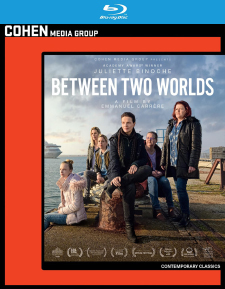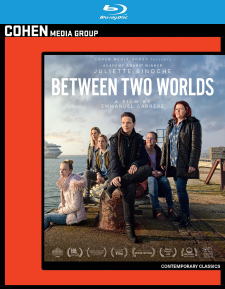Between Two Worlds (Blu-ray Review)

Director
Emmanuel CarrèreRelease Date(s)
2021 (September 12, 2023)Studio(s)
Cinéfrance/France 3/Curiosa Films/Studio Exception (Cohen Media Group/Kino Lorber)- Film/Program Grade: A-
- Video Grade: A
- Audio Grade: A
- Extras Grade: D
Review
Sort of a French Nomadland, Emmanuel Carrère’s Between Two Worlds (Ouistreham, 2021) explores the often dehumanizing, sometimes nightmarish world of “precarious work,” working poor forced into back-breaking minimum-wage jobs. Adapted from Florence Aubenas’s autobiographical The Night Cleaner, it follows a writer, Marianne Winckler (Juliette Binoche) who conducts research undercover, eventually becoming a cleaning lady aboard a ferry service between Ouistreham, Normandy, France and Portsmouth, England.
She becomes friends with, and earns the trust of, several women, particularly single mother Christèle (Hélène Lambert), but also young adult Marilou (Léa Carne), as well as Cédric (Didier Pupin), a craggy-faced laborer who dreams of one day owning a pizza truck, with whom Marianne has a kind of budding romance.
Like Nomadland, the film shows these men and women, along with other working poor French and Sudanese immigrants, toiling away working insanely difficult jobs. On the ferry a handful are expected to fully clean nearly 300 cabins within a matter of hours, allowed just four minutes per cabin to change the linens, clean the toilets, wipe everything down, etc. Some passengers are considerate but many are not, leaving vomit and other human waste behind for them to clean-up. They work long, middle-of-the-night hours, some walking hours to get there because they can’t afford a car, and are too poor and exhausted to do much beyond collapse into bed when they return home.
For this work they make less than eight euros/hour after taxes, while various Karen-types berate them like slaves for not cleaning their microwave ovens to the point of looking brand-new again.
Misery loves company, I guess, because in spite of everything these hard-working, hardly compensated people cling to one another through their shared experiences and become close. In a disarming scene, Christèle surprises Marianne with a birthday cake and present from her and her three small boys. Only weeks (?) before, Marianne spotted Christèle looking through her purse, assuming—because she’s poor, right?—that she was stealing money. Instead, Christèle only wanted to check Marianne’s I.D. to find out when her birthday was. The cake is modest and the present a trinket, a little necklace with a four-leaf clover. But, for Marianne, it carries the same weight as the bowls of rice served to the Seven Samurai by the peasant farmers. It may not be much, but Christèle is giving Marianne everything, all she has.
In being undercover to write a book she hopes will inform and create understanding for the suffering of these workers, Marianne, of course, nevertheless deceives everyone around her. Unavoidably it’s still a kind of betrayal, and in the film’s final scenes we learn that some of her co-workers, supervisors, and social workers understand and even appreciate what she had to do, others closest to her do not. The film’s strength here is that these scenes are resolutely unsentimental, yet still emotionally difficult to watch. Ultimately, there’s an unwritten but clear class divide between Marianne and those she wanted as lifelong friends but cannot have, with strong arguments on both sides of this divide.
Marianne can return to her world of relative economic security (as a writer, though?). She seems sincere, yet what does he hope to accomplish with what might easily be perceived as “poverty porn?” To make those less unfortunate behave better around “the help?” Surely their working conditions are no better, possibly worse than before. In one sense, and the film points to this, Marianne’s book really changes nothing.
Binoche can’t hide, even pushing 60 and without make-up, her great natural beauty, but she’s convincing and the mixed and deep emotions her character expresses are authentically expressed. Apparently but unsurprisingly all of the other actors were not professional actors—to a one they feel like real people working these terrible, low-paying jobs.
The film also resembles Nomadland in the way it makes these workplaces almost surreally nightmarish, like that earlier film’s THX-1138-like depiction of Amazon’s warehouses. Mathieu Lamboley’s Philip Glass-like musical score adds to this uneasy ambience.
Shot in 4K for 2.35:1 ‘scope exhibition, Cohen Media Group’s Blu-ray of Between Two Worlds looks and sounds great, with audio presented in French 5.1 surround and 2.0 stereo mixes. The subtitles are excellent and the disc is Region “A” encoded. The lone extra is a trailer.
Between Two Worlds exposes a side of human drudgery and insecurity a wider audience needs to vicariously experience to even begin to understand. It’s a small, modest film, but its implications are gargantuan.
- Stuart Galbraith IV

